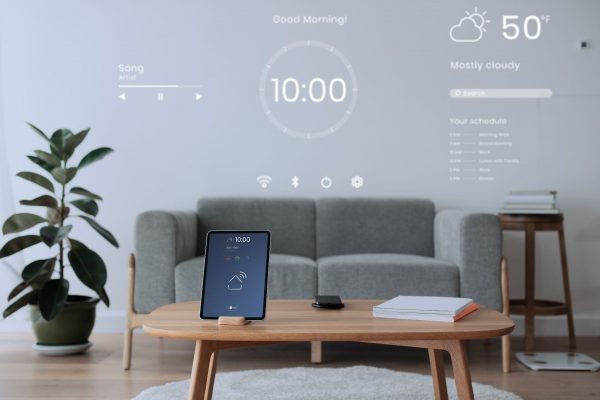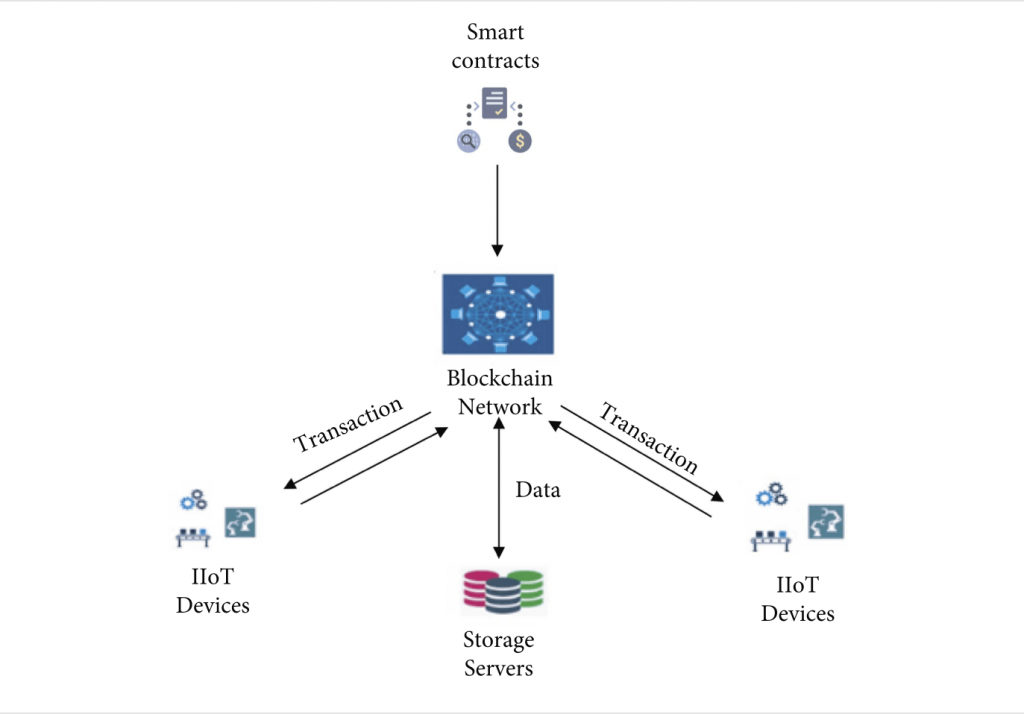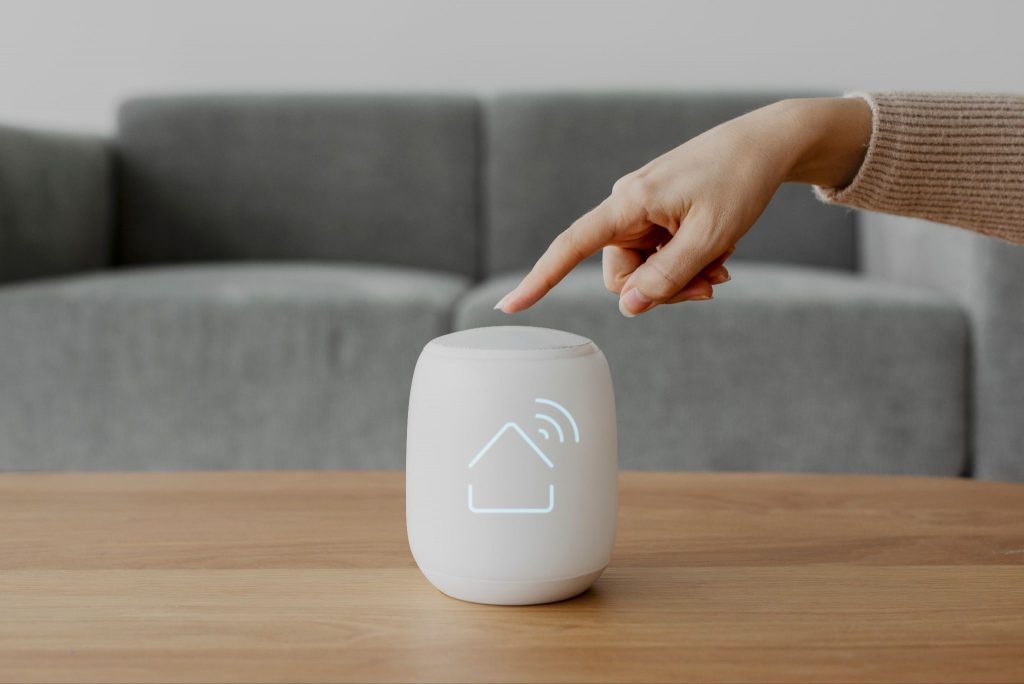Blockchain and Internet of Things (IoT)

The brand new technology of the Internet of Things is joining products, people, and places all together to offer opportunities for value creation and capture. This innovation embeds sophisticated chips, sensors, and actuators into physical items that consistently transmit data to the IoT network. This data is used to convert insights into action by the analytics capabilities of the IoT, which revolutionize business processes and lead them to new ways of performing. However, several technical and security problems remain unaddressed and halt its progress.
Security is a significant problem with IoT that has inhibited its massive deployment so far. Some IoT devices often suffer from security vulnerabilities that make them effortless prey for Distributed Denial of Service (DDoS) attacks.
To elaborate, DDoS attacks are defined as multiple compromised computer systems that bombard the primary server, with a considerable volume of accompanying data requests, thereby causing a denial of service for users of the connected system.
In recent years, some DDoS attacks have disrupted organizations and companies. It is an easy target for cyber-criminals to manipulate the vulnerable security shield to hack them into launching DDoS attacks, which is provided by unsecured IoT devices.
Scalability is another issue with IoT networks. Since devices connected through an IoT network grow in number, current centralized systems to authenticate, approve and link other nodes in a network will become a bottleneck. This can highlight the importance of considerable investments in servers that can handle massive data exchange. The whole network can get eliminated if the server becomes inaccessible.
The devices store much personal information gathered from different IoT devices, which need to be secure, and only the owner and approved and verified stakeholders can have access. The blockchain is one of the potential solutions to assure the integrity and security of information. The owner can control his data sharing on his terms through smart contracts. Significant edges of blockchain technology in IIoT are the immutable records, decentralized system, and nonrepudiation of stored information. We can comprehend the general working mechanism of smart contracts with the IIoT-based system in this Figure.

Therefore, The smart contract executes the data provided by the devices and stores them in the blockchain.
Nowadays, Gigantic companies have recently focused on the IoT space. Yet, security is still an Achilles heel for most of them, and the nature of centralized technology is an obstacle to cross-device communication. Fortunately, Blockchain technology can assist solve that problem.

Here are eight examples of how Internet-of-Things companies use blockchain to connect the world better.
Helium
How they are implementing blockchain technology in the Internet of Things :
Helium is the first decentralized machine network provider in the world. The company employs blockchain to connect low-power consuming IoT machines such as routers and microchips to the Internet. The blockchain-based wireless internet infrastructure of Helium uses radio technology to amplify internet connections and significantly diminish the energy needed to run “smart” machines.
Real-life use case:
The Helium team recently conducted their first successful blockchain transaction. The company now plans to implement its nodes across California, Boston, and the UK to test their decentralized peer-to-peer networks.
Chronicled
How they are implementing blockchain technology in the Internet of Things :
Chronicled integrates blockchain and IoT products to provide an end-to-end supply chain solution. The chronicled solution focuses on the pharmaceutical and food supply industries and utilizes IoT-enabled shipping containers and sensors to give real-time updates on shipping procedures.
Implementing blockchain in their devices permits all parties entangled in a medicine or food supply shipping operation to be totally mindful of the chain of control and any issues during the process.
Real-life use case:
the Chronicled newly designed technical pilot shows how blockchain supply chain events can be registered without a third party. The blockchain assumed the pharmaceutical industry’s stringent data privacy policies and complicated handling rules to record a supply chain of circumstances successfully.
ArcTouch
How they are implementing blockchain technology in the Internet of Things :
ArcTouch develops and builds blockchain-based software for a spectrum of intelligent, connected items, including voice assistants, wearables, and smart TVs.
The company has created personalized, decentralized apps (DApps) for many companies that link to gadgets and devices. ArcTouch’s DApps supply an additional level of IoT security and can process contracts faster via smart contracts.
Real-life use case:
The company’s several blockchain DApps can connect to devices like Amazon Alexa and Facebook Messenger.
Filament
How they are implementing blockchain technology in the Internet of Things :
Filament designs blockchain-based hardware and software that smoothly integrates with IoT products. Blocklet is the company’s blockchain suite, which focuses on strengthening IoT devices’ data security for the construction, manufacturing, energy, and transportation industries.
Filament’s DLT ecosystem delivers a promoted cybersecurity protocol and authorizes quicker communication between devices in various industries.
Real-life use case:
the Blocklet USB Enclave, an industry first is introduced by Filament recently. The blockchain appliance plugs into any USB port and instantly launches any project on a blockchain.
The company also has a Blocklet microchip in the works that integrate into an hardware system.
We never know what the future brings, but it is obvious that blockchain and IoT technology will be a significant part of the future. This technology is ready, affordable, and secure. Speed and cost are the two primary barriers to implementing blockchain in technology. However, That’s no longer the case. IoT and blockchain interoperability is an influential step in fully adopting distributed ledgers as a trusted technology.
Let’s make it actionable! If you and your business are interested in IoT and blockchain technology, blockchain experts at the Dadehpardaz can provide your company with the newest blockchain solutions.




